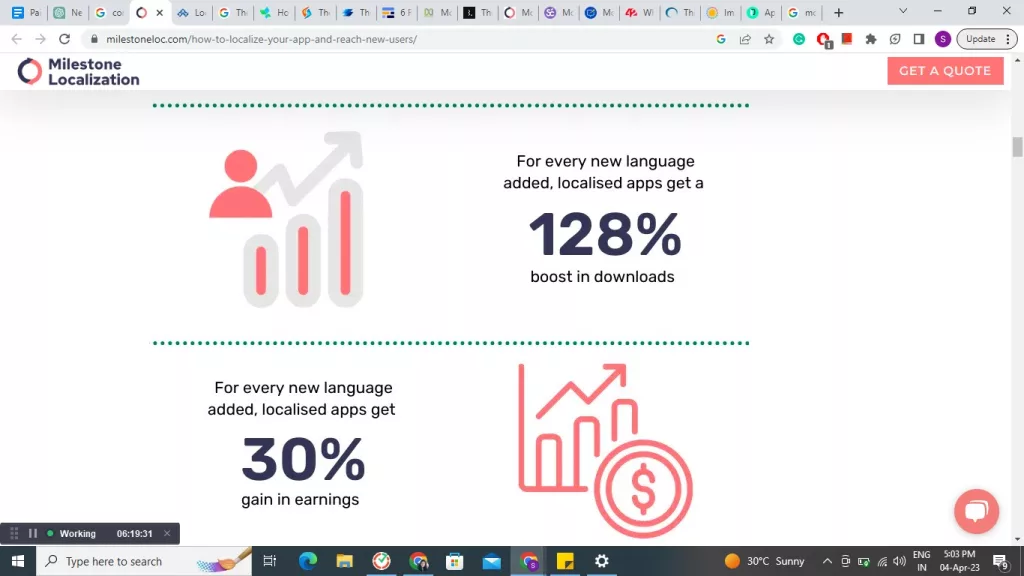
Have you ever tried to use a mobile app that’s not available in your native language? It can be a frustrating experience, right?
Now imagine if you’re a business owner trying to expand your reach in a foreign market without localizing your app. It can be an uphill battle.
In fact, according to CSA Research, 76% of consumers are more likely to buy from a website or app that’s in their native language. So, if your app isn’t localized, you could be missing out on a significant amount of revenue.
Take ASOS, for instance. ASOS localized its fashion app into multiple languages, resulting in a 47% increase in international sales in 2020. This allowed the UK-based retailer to expand into new markets and achieve business growth.
So, the question is, how can businesses overcome the challenges of app localization and tap into the growing global market? In this article, we’ll explore the importance of localization in mobile app development and provide tips and strategies to help businesses succeed in foreign markets.
Current State and Usage of Localization in Mobile App Development
Did you know that only 25% of mobile apps are currently available in languages other than English? Whereas,

Source: Milestoneloc
That’s a surprising statistic, considering the global nature of today’s economy.
According to a report by Milestone Localization, companies that invest in app localization can see an average return on investment of 30%. Companies such as Airbnb and Uber have already reaped the benefits of localization in new markets.
With the ever-increasing use of mobile apps around the world, the importance of app localization cannot be understated. As mobile apps continue to dominate our daily lives, it’s important for businesses to recognize the importance of localization in creating a positive user experience and expanding their global reach.
Why App Localization Is More Than Just Translating Language: The Importance in Mobile App Development.
In today’s global market, businesses need to cater to a diverse audience with different languages, cultures, and preferences. Mobile app development for localization has become an essential tool for businesses to connect with customers and increase their revenue streams. However, developing a mobile app is not enough. Custom android app development services can help businesses looking to succeed in the global market. In this article, we will explore the four key reasons why app localization is essential for businesses.
1. Speak Their Language: Enhance User Experience through App Localization
One of the biggest challenges businesses face when developing mobile apps is ensuring that users have an excellent experience. App localization helps to overcome this challenge by providing a personalized experience to the user in their native language.
The Wolfestone Group’s report states that 56.2% of consumers consider the availability of information in their native language to be more crucial than the cost.
By providing content in the user’s preferred language, businesses can improve user satisfaction, engagement, and retention rates.
2. The Road Less Travelled: App Localization for Market Expansion
The challenge for businesses is to reach a broader audience, and app localization can be a powerful tool to achieve this goal.
A report by Common Sense Advisory, consumers prefer to purchase products and services in their native language, while 60% of consumers rarely or never buy from English only websites. Thus, businesses that do not offer app localization may be limiting their market reach and missing out on potential revenue streams. By localizing their apps, businesses can expand their audience and reach new markets, increasing their market penetration.
3. Break Through the Noise: App Localization as a Competitive Advantage
In today’s crowded app market, it’s crucial to stand out from the competition. App localization can be a key differentiator, as many businesses do not offer it.
By offering localized content, businesses can set themselves apart from the competition and provide a superior user experience. As a result, it can lead to higher customer loyalty and positive recommendations through word-of-mouth.
4. Long Term Savings: A Wise Investment
Developing a mobile app is a significant investment, and businesses need to ensure that they maximize their return on investment. App localization may seem like an additional cost, but it can save businesses money in the long run.
IKEA’s app localization efforts allowed the company to reach new markets and increased sales by 10% and helped to build $42 billion. Additionally, businesses that localize their apps can reduce their customer support costs, as users are more likely to understand the app’s features and functions when they are presented in their native language.
By investing in app localization, businesses can achieve long-term cost savings while providing a better user experience.
Conclusion
As the world becomes increasingly interconnected, it’s no secret that localization in mobile app development has become more important than ever before. In fact, failing to understand the difference between localization and translation could mean the difference between success and failure in today’s competitive market.
That’s why it’s crucial to work with a reputed mobile application development agency in the US that can help you take the right approach. By doing so, you can ensure your app is not only functional and user-friendly but also culturally relevant and tailored to the unique needs of your target audience. In other words, localization is no longer a luxury, but a necessity for those who want to stay ahead of the curve.







